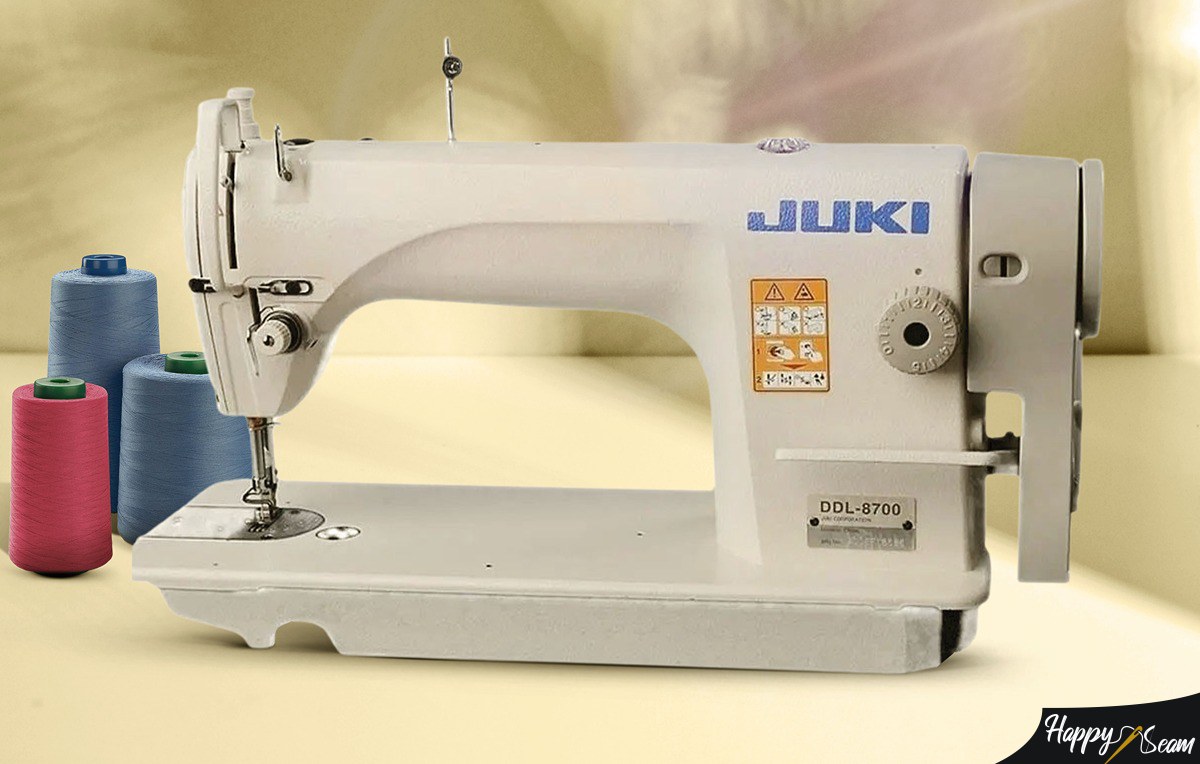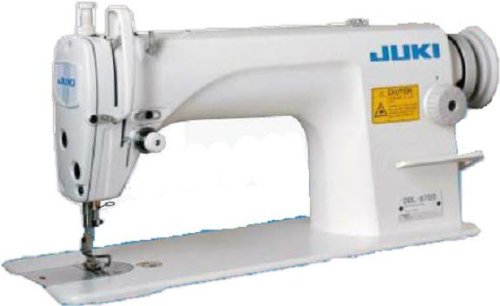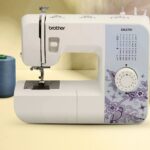Juki DDL 8700 made an appearance on the market in the 1960s and has been a favorite machine amongst factories, tailors, and people who sew in their own homes. A powerful machine loved by many for its speed, precision, and reliability. It falls into the group of industrial machines, so without a doubt, we can say it is a light, medium, and heavy-duty sewing machine.
It is a straight stitch-only machine, when combined, the speed and the quality of the stitch, become very wanted by most professionals’ dressmakers, and serious hobbyists. It is a bit of a fast-sewing machine for those who are entering the field of sewing for the first time. But once you get used to its speed you will fall in love with the precision of the high-quality stitches that it delivers.
Key Takeaways
- Juki DDL 8700 is an industrial sewing machine lockstitch, one-needle sewing machine.
- It can sew anything from delicate fabrics to medium-thickness denim.
- It is a low-noise, high-stitch speed sewing machine.
A General Overview of the Machine
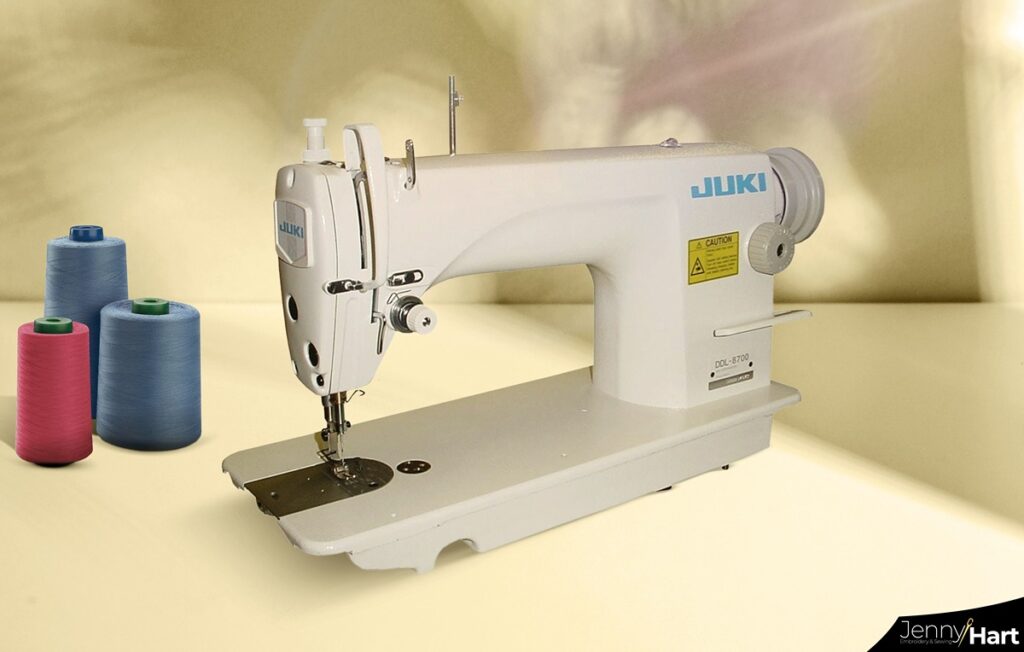
Performance
Juki DDL 8700 is not a walking foot sewing machine, but still, it is a very practical and powerful one. It has an advanced, modern design of the head, which in combination with the horizontal shuttle doesn’t allow the machine to vibrate too much. We can also safely say that is among the best industrial sewing machines
This means you will not get to hear the annoying high noise and vibration previous models made. The body and most parts of the machine are built from metal, that’s why it is a heavy machine. You should keep that in mind when it comes time to assemble your machine, you are going to need a helping hand.
The speed of the machine Juki DDL 8700 is 5500 stitches per minute, which is pretty outstanding for a machine of this kind. It owns an automatic lubrication system 110-volt servo motor that takes the responsibility of oiling the machine on your shoulders.
Design
The Juki DDL 8700 is a compact, medium-sized sewing machine. Hence it makes it very suitable for a house sewing machine, it fits perfectly inside a normal size room in your house.
- Dimensions: 15x13x11 inches
- Weight: 15 pounds
- Sleeve: 260×130 mm
- Presser Foot Height: 13 mm
Also, read a list of wonderful heavy duty sewing machines.
Types of Fabric That It Can Sew
This industrial sewing machine is very versatile when it comes to the types of fabric it can sew. It is incredibly gentle with light and delicate fabric. It can sew through light lingerie, silk, and other delicate textiles without tearing the material apart or tangling it.
Also, it can sew cotton and polyester. It can sew from light textiles to medium-duty fabrics. Even though it is meant for thinner materials, medium materials don’t represent a problem for this beast.
It can sew through medium-duty denim and leather, so you will have no trouble stitching seams on your jeans or handbags. Also, you can sew knitwear without ripping the material or ruining the patterns.
With this machine, I have sewed many tutus, dresses, headbands, denim pants, and jackets for my young niece. And I can easily say that it does wonders with fine delicate fabrics, as well as denim which is a bit thicker, especially doing the seams.
The stitches and the seams are simple perfections. The final look of the project is fascinating as if it was bought from a high fashion brand. My niece was so happy with her new wardrobe and accessories that she used to show them to everyone so proudly. And no one could notice they were sewn by me, and not bought from a boutique.
Let’s Talk About Its Features
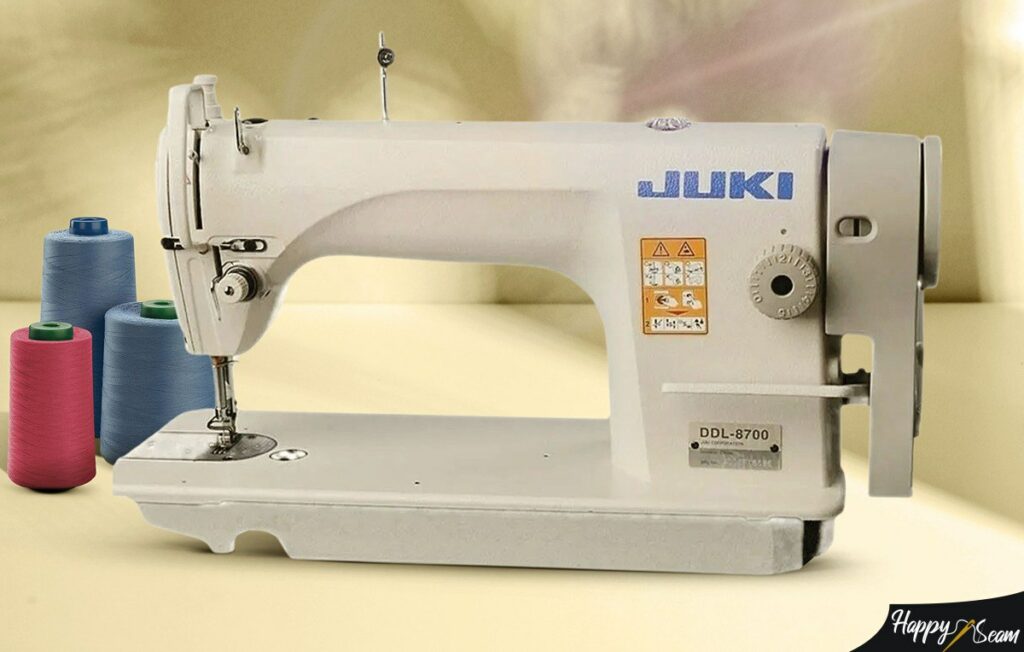
An Industrial Old Timer
Juki DDL 8700, as we mentioned above, is an industrial sewing machine for light to the medium-duty fabric. It is one needle, straight stitch/lockstitch machine, which in translation means that it does not have a list of stitches to choose from.
However, the one stitch that it does, does it perfectly. One of the features I loved the most is that it has a wide working table, ad a high distance between the needle and the arm of the machine. Hence you can sew bigger projects without feeling restricted.
It comes with a knee lifter the height of which you can adjust according to your preference and needs. The knee lifter helps you lift the presser foot for you to add more fabric without taking your hands off the fabric to lift the presser foot.
Manual and Mechanical Working Process
Your hands are free to adjust the fabric and keep control of it. It is a mechanical machine and not a computerized one, meaning you have to adjust every feature manually, like the length of the stitches, the speed, the pattern, and the direction of the stitches.
For some people is easier and simpler to do, rather than the complicated features of a computer. You can even adjust the speed according to your preference, the speed leveler is found on the engine of the machine.
It has forwards and backward stitching features. To do backward stitches, or in reverse, you have a leveler on the back end of the head of the sewing machine, which you need to push down. It has the option to adjust your stitch length from one to five. You have to be careful though because some materials don’t take well on stitches very close to each other. They can get ripped into big holes.
Also, read Juki Du 1181N industrial machine review.
Needle Size Guide
The needle type for Juki DDL 8700 sewing machine is DBx1; 16×231/257.
If you go for a size 60 needle you are going to be able to sew silk and other very delicate and smooth materials. Size 80 needle is for a bit thicker silky fabric. Size 90 is for linens, light wool, etc. Size 100 is meant for materials of medium thickness like some medium denim textiles. So, the thinner the needle, the thinner should the fabric be. And as we go up in the size of the needle, the thicker the material it can sew.
The same goes for the thread, you can use thick and thin threads on the Juki DDL 8700. And the thinner threads are meant to sew through silky and finer fabrics. The thicker the fabric then the thicker should the thread be since thinner threads will rip.
A Lockstitch sewing machine is a machine that can do only basic, straight stitching like our Juki DDL 8700. The machine interlocks two pieces of thread from two separate bobbins, and they are very hard to unravel, unlike other patterns of stitches which you can pull apart very easily.
It is a stitch that has the same appearance on the front as in the back.
A lockstitch or straight stitch is a stitch that creates very durable seams. It is the first of its kind to appear on the market, and it remains one of the most wanted to this day.
Also, read the Juki HZL-F300 machine review.
Final words
From my experience with the Juki DDL 8700, I can confidently say the machine is a very practical and powerful beast. An ideal sewing machine for household use, with incredible stitch speed, so you have to be a little bit more careful about that if you are a beginner.
It does a great job on many different projects you might want to sew. I can promise you that it will be worth the investment you put into this machine. I hope you found my insight with this machine helpful.
I graduated from London College of Fashion, and I’ve been working for a Fashion Design company for 10 years. My other hobbies are going to the gym and reading.
